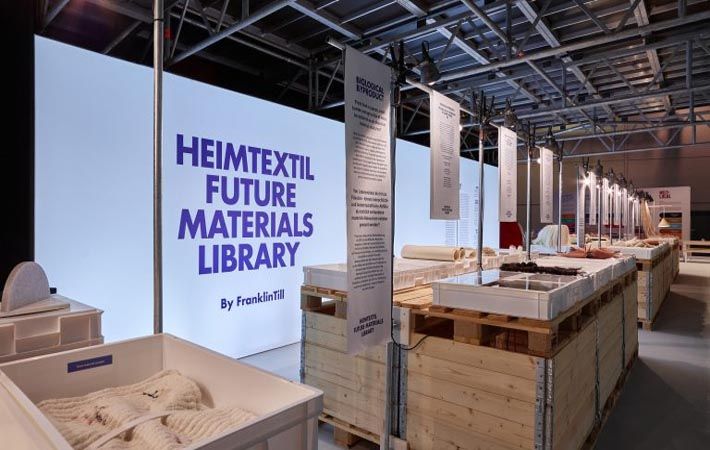Heimtextil is extending its range of digital services and launching a new online materials library entitled ‘Future Materials Library’. In the online library, visitors can discover the potential of previously unknown textiles at any time. The ‘Future Materials Library’ invites visitors to open their minds to experimental approaches and revolutionary ideas.
The curators of the new materials library are London-based futures- research agency, FranklinTill. The Future Materials Library 2021 offers materials pioneers a platform and presents a first-class mix of economically proven and revolutionary developments. FranklinTill has organised the materials in four themes; Regenerative Crops, Remade Fibres, Harvesting Waste Streams, and Sustainable Colour, according to a press release by Messe Frankfurt.Heimtextil is extending its range of digital services and launching a new online materials library entitled 'Future Materials Library'. In the online library, visitors can discover the potential of previously unknown textiles at any time. The 'Future Materials Library' invites visitors to open their minds to experimental approaches and revolutionary ideas.#
An example of a supplier of regenerative crops is the British company Tengri, which obtains rare yak fibres directly from a cooperative of nomadic yak shepherds in the Khangai region of Mongolia. In this way, Tengri enriches the pool of sustainable natural materials that, in addition to yak fibres, includes hemp, nettle and flax. When it comes to remade fibres, the Finnish pioneers from Ioncell supply a pioneering material: they use an ionic liquid to turn used textiles, pulp, old newspapers and cardboard into strong textile fibres, which are then used to make long-lasting, high-quality fabrics, Messe Frankfurt said.
The French-Dutch company Tarkett also exploits waste products and gives fitted and used floor coverings a second life. With the aid of ground-breaking technologies, the two main components of carpet tiles, yarn and backing, are separated and a yarn purity of 95 percent guaranteed. Against the background of 28 million tonnes of food being thrown away every year in Japan, the country’s Food Textile company is dedicated to the reduction of food waste, which it uses to make sustainable dyes. In a patented process, blueberries, red cabbage, coffee, and matcha are turned into natural, brilliant textile dyes. With their different approaches, these textile pioneers provide an exciting contribution to the transformation of the current linear system of production and consumption into a circular model. This is in line with the objectives of the ‘Future Materials Library’, which aims to convince both producers and consumers of the benefits of the circular-flow economic principle, according to Messe Frankfurt.
The ‘Future Materials Library’ is part of the Heimtextil Trends that, for almost three decades, have been offering orientation for the sector by revealing design tendencies for the coming season. Even in the crisis, the Heimtextil Trends remain a vital part of the overall concept of the fair and provide important content for all target groups involved within the worldwide sector. Accordingly, Heimtextil aims to spotlight style-defining design developments taking place within the larger context of lifestyle trends.
Fibre2Fashion News Desk (GK)
